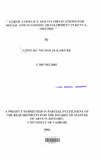| dc.description.abstract | Surrounded by neighbors, in the Horn of Africa and the Great Lakes region, who have
been ravaged by war in recent history, Kenya, which has enjoyed relative peace in its
post-independent political history, is often lauded. It is seen as an "island" of peace in a
"sea" of political turmoil. However, Kenya has experienced political instability
characterized by ethnic conflict that has deep historical roots, which has had negative
implications for development. Ethnic conflict in Kenya conceals the struggle for the
capture of state power and the exploitation of state resources by small sections of the
political elite, which not only negatively affects Kenya's social and economic
development, but also perpetually hinders and threatens the country's unity and state
cohesion. Kenya, therefore, has historically developed as an unstable, fragile and
undeveloped state on the brink of collapse and disintegration. Ironically, the "informal
distribution" of resources has ensured unity in spite of ethnic conflict. Ethnic conflict in Kenya, has affected social and economic development in five ways:
The use of state power, by small ethnic elites, to plunder national resources through state patronage while inciting ethnic rivalry; social and economic trickle-down of state
patronage from these small cliques at the centre of power to specific groups related to
them by blood, regions from which they hail or draw political support leading to unequal
distribution of national resources; the "eating" culture is not only among small political
elites, but also officials in the bureaucracy, the public and private sectors and society at
large leading to uninhibited plunder of the economy; ethno-politicization of development
leading to the neglect of the social and economic welfare of ethnic groups that do not
offer support to the political elite at the centre of power; the preoccupation with ethnic based struggle for state power diverts energies, which should be focused on improving
the social and economic well being of all Kenyans.
This study relied on primary sources such as the national censii, Government
publications: Kenya Economic Surveys, Economic Plans, Annual Budgetary Estimates,
Economic Review of the Central Bank and Statistical Abstracts. Personal unpublished
papers and secondary sources such as books, journals and newspapers were also used. | en |

